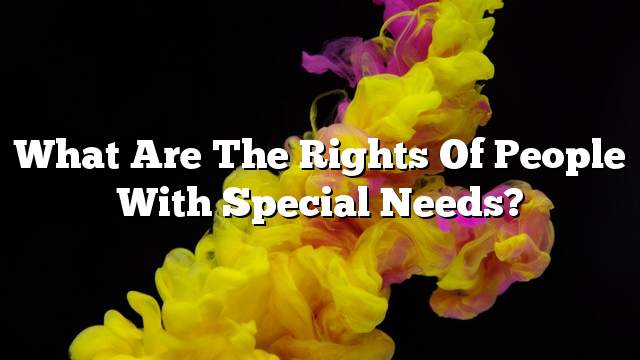special needs
Special needs is a term used to describe people who need help and rehabilitation because of health problems in a part of their body, that is, because they have a medical, mental or mental disability. The disability, according to the World Health Organization (WHO) Lack of activity, and a sense of restricted participation and difficulty in the implementation of tasks and business, so special needs are complex phenomena in our society, because they limit the ability of the individual and reduce productivity in society.
Rights of people with special needs
Transport and Communication
- Supporting public and private transport for seats that meet the needs of people with special needs, and searching for scientific and practical criteria for safety in buses, cars and trains.
- Place audio visual alerts at traffic lights and transit locations to help people with audio and visual problems as they cross the road.
- Allocation of parking spaces for handicaps, whether motor, audio or visual.
- Exemption from material violations in the absence of a special entrance or parking for people with special needs.
- Paste the universal logo for people with special needs on their cars, to clarify the type of disability.
- Put a talking device in the public cars, so that it serves as a sound map to them to know the place of their direction and direction.
- Give people with special needs a chance to train and drive their own cars.
- Facilities, facilities, buildings, sidewalks and gardens are designed to suit the needs and abilities of people with special needs. For example, writing can be done by public signs, because signals alone are not enough for people with hearing problems.
the work
- equality: To have a fair chance of working without discrimination, injustice or tyranny.
- Fair and satisfactory conditions: Conditions for the conditions of the work environment and the number of work hours and vacations shall be appropriate for the health, psychological and physical capacities of persons with special needs.
- Adequate remuneration: The wage should cover basic necessities and consumables such as clothing, housing, food, health and education.
- Protection against unemployment: Persons with special needs have the right to work continuously.
- Organization: Persons with special needs shall have the right to organize and form trade unions responsible for the rights of persons with disabilities, in order to demand collective rights in case of non-availability.
- Discrimination between Right and Care: Ie, that persons with disabilities obtain their original rights to work, and not only provide economic support for their care.
Educational integration
Educational integration is to provide people with special needs an opportunity to engage in the special education system, and to follow the teaching methods and methods that help the child to be able to face the problems and challenges in the regular schools, and this is through the inclusion of all students in classrooms and schools of education regardless of disability , The treatment of children with disabilities in general education, and the provision of educational services to them at the level of integrated and successful taking into account their circumstances.
Social interaction and play
Playing is one of the most important rights that a disabled child must have; because he transforms him into a social child capable of dealing with others in the community. In general, toys are used to treat mental disabilities in children and adults because the person suffering from mental problems tends to be isolated. Can make friends, so experts advise the treatment of mental disabilities to play through dealing with money and transportation transport; to overcome the isolation of people with special needs.
